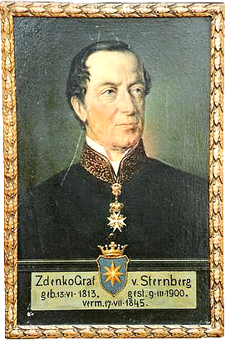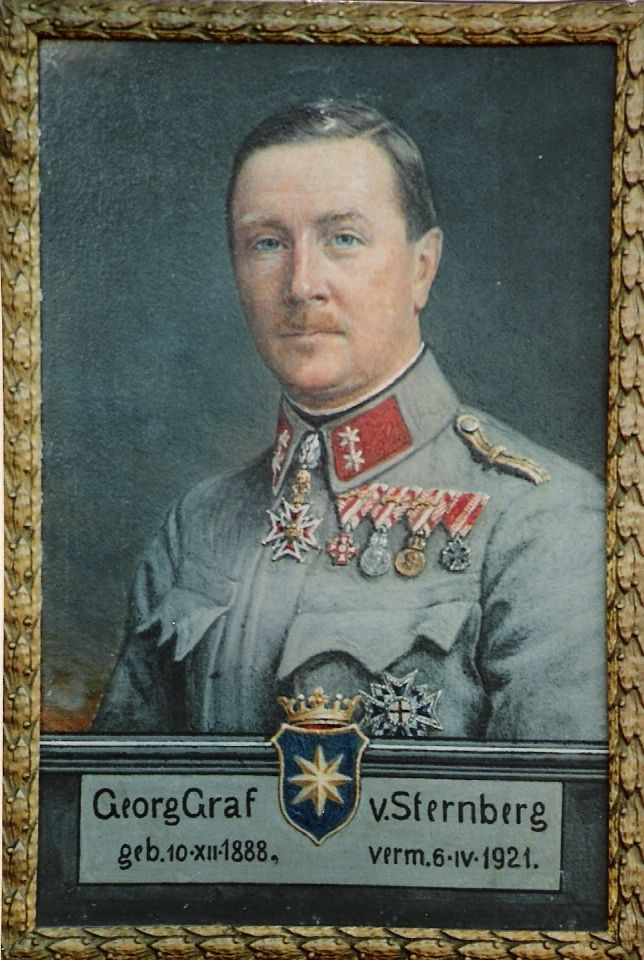History of the family of Sternberg
The line of counts of Sternberg belongs to the oldest Czech aristocratic families in the country. Its members committed themselves in the Czech political and cultural history.
Their alleged grandfather Diviš lived at the beginning of the 12th century. In the 13th century Zdeslav of Sternberg eternalized himself thanks to his courage. Zdeslav was the member of the company of the later King Přemysl Otakar II, who in 1253, established the defence of the town Olomouc. Because the dispute about Austrian legacy, which Přemysl waged against Hungarian King Béla IV, took place in Moravia.
Hungarian nomads laid siege to Olomouc and Zdeslav of Sternberg prevailed their army, killed their leader and put Hungarian nomads to flight.
On the other hand, heroism of Jaroslav of Sternberg, who reputedly defeated Mongolian troop in 1214, is the pure romantic fairy-tale from the 19th century . In that time, this legend was very popular; also many pictures describing this scene came from the 19th century. They can be seen in many Sternberg's seats. In the surrounding of Olomouc and in their Šternberk castle, Sternbergs lived for centuries. At the return of the 13th to the 14th century, Albert Sternberg (+ 1380) was enternized; he addressed to church career, became dean of chapter house, bishop in Zvěřín (current Schwerin in Meklenbursk), bishop in Magdeburk and in Litomyšl. Moravian line of Sternbergs did not live to the end of the 16th century.
 The second line, so-called Holický from Sternberg became famous in the 15th century. One part of the family started to profess Hussitism. Kunigunda from Sternberg (1422-1449) married later Bohemian King Jiří from Kunštát and Poděbrady. She was popular among people for her Hussite faith, people called her "Mother of poor people".
The second line, so-called Holický from Sternberg became famous in the 15th century. One part of the family started to profess Hussitism. Kunigunda from Sternberg (1422-1449) married later Bohemian King Jiří from Kunštát and Poděbrady. She was popular among people for her Hussite faith, people called her "Mother of poor people".
Peter from Sternberg fought against Hussite revolution. In 1414, he went with the bishop of Litomyšl Jan Železný, the oponent and enemy of Master John Hus, on his way to Kostnice. After his return to Bohemia, he participated in the fight against Hussites. He collected soldiers and attacked Hussites. He fought against Jan Žižka at the battle of Sudoměř, Benešov and he was killed at the battle of Vyšehrad in 1420.
Another member of the line, Aleš of Sternberg (+1455) also stayed Catholic and was in service of the King Zikmund. However he was both politically and religiously very modest and tried to solve problems without violence. However, he did not avoid wars. In 1422, he captured and burned out Rakovník. Later, Hussites forced him to admit and signed four conditions for Hussite faith (so-called Čtyři artikuly pražské). In 1434, he fought at the battle of Lipany, which meant the final defeat of Hussite extremists and opened the way to the stabilisation of relation in the country.
The members of the line Holický from Sternberg held many important offices in public administration during following centurie. In 1712, they died off in male tail. The line of Konopištský from Sternberg lived up to now and even they influenced wild periods at the beginning of the 15th century. Zdeněk of Sternberg (+1476), passionate, merciless and selfish nobleman, was a typical demomstration of a person, who can exploit situation and change his political and religious opinions according to circumstances. At first he supported the King Jiří from Poděbrady but later, he attached to his opposition. Under pretence of defence of the faith he abused a quarrel between the Kinf and the Pope and in terms of Greenhill unity he made a stand against him. Thanks to the bull, he was appointed the leader of the catholic part. However, Jiří from Poděbrady proclaimed him to be "troublemaker" and made war upon him. In 1468, Zdeněk was defeated in Konopiště, ran away and associated with the Hungarian King Mathias. Mathias nominated Zdeněk the highest Bohemian supervisor. After the death of the King Jiří, some estates in Bohemian were given back into the hands of Zdeněk.
His son Jaroslav (1463-1492) probably inherited father's character. Jaroslav was royal controller of Horní Lužice but because of his nature he was evicted from this area.
During the 16th century the line spread and its property was changing all the time. Within corporative riot in 1618, some members of the Sternberg family, e.g. Václav (+1628) took in with the revolt and was punished by lost of his property. Štěpán Jiří (Stephan George) of Sternberg (+1625) trusted in Holy Grail and took part in the rebellion against the Emperor but after the battle of Bílá Hora he went over to Catholic Church.
František Filip of Sternberg (Frances Philip, 1708- 1786) reached significant success, Knight of the Order of Golden fleece, politician and diplomat. His grandson František Josef (Frances Joseph, 1763-1830) inherited earldom of dead counts from Manderscheid; he was a very educated man, patron and politician. He resided in Prague and met famous scientists and artists. He supported the development of science and art in Bohemia. He became a collector of art graphics, pictures and experienced musician. At the end of the 18th century he had merit in the establishment of Party of Patriotic Friends of Art. After the establishment of the National Museum, he presented the collection of coins and archival documents to this new institution. In the 19th century, the Sternberg-Manderscheid line died off in male tail.
Also Jáchym Sternberg (1755-1808) was an expressive member of Sternberg family. He was brought up by Františkek Martin Palec and served as wab in imperial army under the direction of general Laudon. However, in his thirties he left army and started to dwelled on science. He dealt with mathematics, chemistry, alchemy and metalurgy. He managed to explain chemical processes in the blast turbace on the basis of oxidation theory. He undertook many journeys in Europe and other continents. He publicated magazines about his travels and experience. His book of travers from Russia was extended, he described here terrible situation of this state. He had big problems with czarist rule, which prevented him from free movement. Probably the most famous member of Sternberg family was Jáchym's brother Kašpar Maria (1761-1838), naturalist and patron. At he beginning he became canon of chapter house in Regensburg and studied botany. Here he met the most famous scientists. During Napoleonic fights, hi laboratory in Regensburg was destroyed. He returned to Bohemia and lived at his château Březina in the region of Rokycany and in Prague. At Březina there he bulit new botanic garden. He devoted the rest of his life to the National museum and presented some of his collestions and finance to it. His special articles were written in Latin or in German. Kašpar Maria of Sternberg was enlightener, opponent of Metternich police regime but also confessor of conservative political power which supported monarchy. He knew democratic reforms should be done immediately, in oppsosiet case people would force it.
Among last generations of Strenbergs, there belongs Vojtěch Václav (1868-1930), a son of Leopolda of Sternberg, who was successful imperial general and laureate of many military honours. Count Václav Vojtěch inherited adventurous character. In the 90's of the 19th century, he travelled through Africa – from the north part of Sahara to the south. He took part in Boer War in 1900 and was prisoned with Boer general Piet Arnold Cronjem (1840- 1911) by Englishmen.
Later, ha travelled through America. At the beginning of the 20th century, he tried his hand at political career and was elected member of Austrian Imperial Council. He was a friend of crown prince František Ferdinand d´ Este and his convinction can be called christianity socialism. He is known to be an admirer of Karel Havlíček Borovský.
He publicated many books of travels and also political booklets which evocated disgrace and quarrels. His political booklets are full of "charisma, simplicity and strong words". He belonged to opponents of Austrian cetralism, he criticised home and foreign politics. Vojtěch of Sternberg was genius adventurer, protector of the weak but his energy was often lost in useless struggles.
 During World War II, the punishment for Strenberg's blue blood came in 1848, when their property was confiscated. The only exception is Jiří Douglas Sternberg (1888-1965) who stayed in the function of castellan at his own castle Český Šternberk. Some members of the Sternberg Family emigrated and lived in Westphalia or in America. Nowadays, the most of property was restituted.
During World War II, the punishment for Strenberg's blue blood came in 1848, when their property was confiscated. The only exception is Jiří Douglas Sternberg (1888-1965) who stayed in the function of castellan at his own castle Český Šternberk. Some members of the Sternberg Family emigrated and lived in Westphalia or in America. Nowadays, the most of property was restituted.
Quoted from the book Modrá krev – Petr Mašek